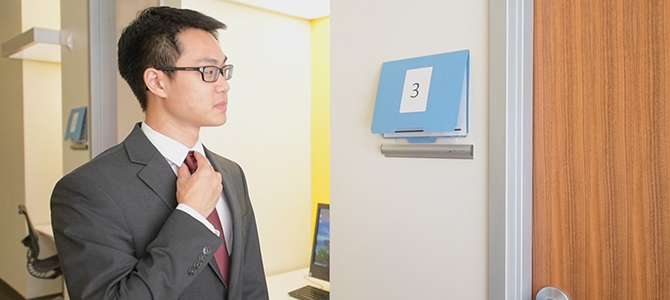
College Offers Unique Approach to Applicant Interview Process

At the beginning of every Applicant Visit Day, when prospective students get a closer look at a medical school, Glen Fogerty, PhD, Interim Assistant Dean of Admissions and Recruitment at the University of Arizona College of Medicine – Phoenix, advises them to consider three elements: “our culture, our curriculum and our community.”
Dr. Fogerty said unique qualities of the College of Medicine – Phoenix are its student-centric approach and support systems, an innovative curriculum tied to early clinical exposure and close relationships with the community and partnering hospitals, including Banner University Medical Center and Phoenix Children’s Hospital.
Another aspect that sets the College apart from three-quarters of accredited allopathic medical schools is the Multiple Mini-Interview (MMI) process. Out of 147 medical schools in the U.S., 38 have made Multiple Mini-Interviews part of their selection process.
At the College of Medicine – Phoenix, the MMI is conducted in the medical school’s clinical education suites. Each applicant has two minutes to read a question or scenario before entering the room and engaging in a seven-minute conversation about the topic. The applicant will repeat the process 10 times with 10 different interviewers, who are faculty members and staff at the College, or community members. During the MMI, each applicant has the opportunity to highlight their strengths without the fear of bias by any one single interviewer.
“The benefits for the candidates in the Multiple Mini-Interviews are numerous,” Dr. Fogerty said. “First and foremost, it allows the candidates to make multiple first impressions as they rotate through their 10 stations. It also allows candidates to have focused conversations that they actually can prepare for during their two minutes before each question or scenario. Finally, if a candidate has a difficult station question or has a tough time connecting with one of the interviewers, the beauty of the mini interviews is the candidate can recover through other interviews and allow the overall impression to hopefully be a positive one – for both the candidate and our medical school.”
This year, 330 prospective students will be invited to campus between August and January. The College has around 150 staff, faculty and community members involved in the process of interviewing students.
“We adhere to a holistic review process where we measure academic preparedness, experiences and attributes, which can best be measured through face-to-face interactions,” Dr. Fogerty said. “All of the candidates we invite to campus are extremely strong on paper and on Applicant Visit Day, these interviews allow us to put the personality with what we see on paper. It allows us to see the whole person.”
Dr. Fogerty describes the day as a two-way street. “For us, it’s all about our culture and finding those candidates who are the right fit for us,” he said. “It’s a two-way street, when these individuals come to campus for us to interview them, they are also interviewing us. We want to make sure it’s a right fit for both sides.”
Shivani Misra, MS2, said she liked the multiple interview process because she felt she was treated like a person and not like an anonymous number.
“All the faculty came out and they showed me what was really special about this school,” she said. “I feel really lucky to be here.”
Media Contact:
Teresa Joseph
Phone: 602-827-2657
About the College
Founded in 2007, the University of Arizona College of Medicine – Phoenix inspires and trains exemplary physicians, scientists and leaders to advance its core missions in education, research, clinical care and service to communities across Arizona. The college’s strength lies in our collaborations and partnerships with clinical affiliates, community organizations and industry sponsors. With our primary affiliate, Banner Health, we are recognized as the premier academic medical center in Phoenix. As an anchor institution of the Phoenix Bioscience Core, the college is home to signature research programs in neurosciences, cardiopulmonary diseases, immunology, informatics and metabolism. These focus areas uniquely position us to drive biomedical research and bolster economic development in the region.
As an urban institution with strong roots in rural and tribal health, the college has graduated more than 1,000 physicians and matriculates 130 students each year. Greater than 60% of matriculating students are from Arizona and many continue training at our GME sponsored residency programs, ultimately pursuing local academic and community-based opportunities. While our traditional four-year program continues to thrive, we will launch our recently approved accelerated three-year medical student curriculum with exclusive focus on primary care. This program is designed to further enhance workforce retention needs across Arizona.
The college has embarked on our strategic plan for 2025 to 2030. Learn more.